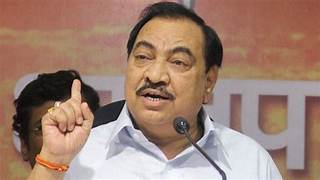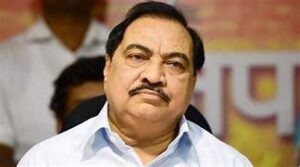Eknath Khadse is one of the most prominent and seasoned politicians in Maharashtra. Known for his grassroots connect, administrative skills, and long-standing loyalty to regional politics, Khadse has played a significant role in shaping the political landscape of the state. From a humble beginning as a farmer’s son to becoming one of the most powerful leaders in the Bharatiya Janata Party (BJP), and later switching allegiance to the Nationalist Congress Party (NCP), his journey is filled with remarkable milestones and turbulent phases.
This article delves deep into his life, political career, achievements, challenges, controversies, and future prospects.
1. Early Life and Background
Eknath Khadse was born on September 2, 1952, in Kothadi village, Jalgaon district of Maharashtra. Coming from a family of farmers, Khadse experienced rural struggles firsthand, which helped him build a strong connection with grassroots issues. Despite limited resources, he completed his education and later ventured into agriculture and local business, laying the foundation for his entry into politics.
His early life was shaped by the socio-political conditions of rural Maharashtra, particularly the agrarian distress and need for stronger rural representation in government.
2. Entry into Politics
Khadse began his political career in the late 1970s. Initially associated with Janata Party, he joined the Bharatiya Janata Party (BJP) during its formative years. His first political post was as Sarpanch of his village. He quickly rose through the ranks due to his organizational skills and mass appeal in North Maharashtra.
In 1989, he was elected as a Member of the Maharashtra Legislative Assembly (MLA) from Muktainagar, a constituency he represented for six consecutive terms until 2014. His consistent victories reflected the trust and popularity he had garnered among his constituents.
3. Role in the BJP’s Rise in Maharashtra
Eknath Khadse played a pivotal role in expanding the BJP’s footprint in North Maharashtra, a region traditionally dominated by the Congress and regional outfits. He helped build the party at the booth level and developed a strong cadre base.
Over time, he became one of the tallest OBC (Other Backward Classes) leaders in the BJP. His influence was crucial in consolidating the Leva Patil vote bank, a significant community in the state. As BJP’s Leader of Opposition (2009-2014) in the Maharashtra Legislative Assembly, he was sharp in attacking the ruling Congress-NCP combine and exposing corruption.
4. Ministerial Responsibilities and Performance
After BJP’s historic win in the 2014 Maharashtra Assembly elections, Khadse was appointed as the Revenue Minister and given other key portfolios including Agriculture, State Excise, and Minority Affairs. He was considered the Number 2 in the Devendra Fadnavis cabinet.
During his tenure, he undertook several initiatives:
- Digitization of land records to reduce land disputes.
- Reforms in the Excise department to increase transparency.
- Streamlining processes in the Agriculture department to support farmers.
However, his growing influence also created internal rivalry within the party.
5. Controversies and Fall from Grace
In 2016, Khadse’s career took a hit when he was accused of misusing his position in a land deal in Pune. It was alleged that he facilitated the purchase of MIDC land at an undervalued price for his family.
This led to a massive political uproar, and he was forced to resign from the Cabinet. The episode caused embarrassment to the BJP, and Khadse found himself increasingly sidelined from the party’s decision-making core.
Other controversies included:
- Allegations of links to underworld don Dawood Ibrahim.
- Accusations of nepotism in administrative appointments.
- Internal opposition from within the BJP ranks, particularly from Fadnavis supporters.
6. Years in the Wilderness (2016–2020)
Post his resignation, Khadse remained in the BJP but was systematically sidelined. Despite being a senior leader, he was denied a ticket in the 2019 Assembly elections, a move seen as a snub. He made several public statements expressing dissatisfaction with the party’s treatment of senior leaders.
His daughter Rohini Khadse was fielded from Muktainagar but lost the election, further denting his political influence.
During this phase, he often expressed displeasure with BJP’s inner politics, especially targeting Devendra Fadnavis, accusing him of orchestrating his downfall.
7. Joining the NCP: A Strategic Move
In October 2020, Eknath Khadse quit the BJP after nearly four decades and joined Sharad Pawar’s NCP. This marked a major political shift in Maharashtra. He was welcomed with open arms by the NCP, which hoped to capitalize on his influence in North Maharashtra.
The move was also strategic for Khadse, as it offered him a new political platform to revive his career and gave him a chance to take on his former party, which he believed had wronged him.
8. Political Impact After Switching Sides
Post his entry into NCP, Khadse began consolidating his support base. While his political clout had somewhat reduced, he still commanded respect among a section of the rural population, especially in Jalgaon and nearby districts.
The NCP used him as a key OBC face and critic of BJP, often fielding him for public speeches against the Fadnavis-led BJP.
However, internal challenges persisted:
- Lack of immediate rewards or ministerial position in the MVA (Maha Vikas Aghadi) government.
- Health issues and aging slowed down his active field engagement.
- His daughter Rohini Khadse’s defeat continued to hurt his local standing.
9. Relationship with Sharad Pawar and Ajit Pawar
Sharad Pawar offered him a respectable position in the party, recognizing Khadse’s decades of experience. However, post the split in NCP in 2023, when Ajit Pawar allied with the BJP, Khadse once again found himself in a complex political matrix.
Khadse remained with the Sharad Pawar faction, a clear sign of his opposition to Fadnavis and BJP leadership.
This loyalty further cemented his role as a veteran who refused to compromise despite shifting equations in state politics.
10. Health Issues and Reduced Public Engagement
In recent years, Khadse has faced health problems, including hospitalizations. His public appearances have reduced, and he is no longer seen as the aggressive political campaigner he once was. Many believe that the twilight of his political career is near.
However, he still remains a symbolic figure—often consulted by the NCP and respected by rivals for his contributions to Maharashtra’s politics.
11. Legacy as an OBC Leader
One of Khadse’s most significant contributions has been his representation of the Other Backward Classes (OBC). At a time when Maratha and Brahmin leaders dominated the political landscape, he rose as a strong OBC voice in the BJP, a party often accused of upper-caste dominance.
He advocated for:
- More representation of OBCs in party posts.
- OBC reservations in government jobs.
- Support schemes for rural and backward communities.
His departure from BJP also highlighted the neglect of OBC leadership within the party.
12. The Political Journey of Rohini Khadse
Rohini Khadse, his daughter, is seen as his political successor. Though her 2019 loss was a setback, she continues to engage with local politics. The Khadse family is determined to retain their hold over the Muktainagar region.
Whether Rohini can carve out a leadership position of her own remains to be seen, but her future will heavily depend on her father’s legacy and her own grassroots connection.
13. Eknath Khadse vs Devendra Fadnavis: A Silent War
Khadse’s fallout with Fadnavis has become one of the most talked-about intra-party rivalries in Maharashtra. From being a strong contender for the CM’s post in 2014 to being unceremoniously ousted from the Cabinet, his career took a nosedive after Fadnavis’ rise.
Khadse has openly accused Fadnavis of orchestrating internal sabotage, while Fadnavis has remained largely silent.
This rivalry underscores how personal ambitions and internal politics can derail even the most promising careers.
14. Analysis of Political Style and Strengths
Khadse is known for:
- Straight-talking, no-nonsense approach
- Strong grassroots connection
- Command over rural and agrarian issues
- Experience in administration and governance
- Support from OBCs and Leva Patils
However, his weaknesses include:
- Getting embroiled in controversies.
- Inability to build a second-line leadership.
- Poor handling of media perception during crisis.
15. Public Perception and Media Coverage
Public opinion on Khadse remains mixed. While many see him as a victim of party politics, others blame him for the controversies that forced his resignation. Media coverage has often painted him as a fallen leader trying to regain lost glory.
His image as a “Maratha rebel” and a voice for the backward classes continues to resonate in North Maharashtra, though newer faces have emerged.
16. Influence on Maharashtra Politics
Khadse’s political journey is significant for several reasons:
- He was instrumental in making BJP a force in Maharashtra.
- He represented a shift in caste dynamics.
- His exit from BJP symbolized the party’s internal leadership crisis.
- His alliance with NCP contributed to shifting political equations in the state.
17. Future Prospects: Retirement or Comeback?
While age and health are not in his favor, Khadse has not officially retired from politics. With the 2024 Lok Sabha and 2025 Assembly elections on the horizon, speculation remains whether he will contest, promote Rohini Khadse, or assume a mentor’s role.
Some believe a political resurgence is unlikely, while others argue that Maharashtra politics is unpredictable and could yet offer him a chance.
18. Political Lessons from Eknath Khadse’s Career
Eknath Khadse’s journey offers lessons in:
- The importance of loyalty versus pragmatism in party politics.
- The dangers of unchecked power and public perception.
- The volatility of caste equations in Maharashtra.
- Resilience in the face of political exile.
19. Awards and Recognitions
Although not awarded formally on a national scale, Khadse has received several local honors for his work in agriculture and rural development. His contribution to strengthening democratic institutions at the grassroots level remains noteworthy.
20. Conclusion
Eknath Khadse’s political story is one of ambition, power, betrayal, and resilience. He may not be the force he once was, but his legacy will remain a part of Maharashtra’s political history. From a trusted BJP warhorse to an NCP strategist, Khadse’s life encapsulates the drama and complexity of Indian regional politics.
As Maharashtra gears up for future political battles, Khadse’s shadow will still loom large, whether through his own voice or the emergence of his political heir.
Would you like a PDF version, images, or this article broken into sections for publishing?

